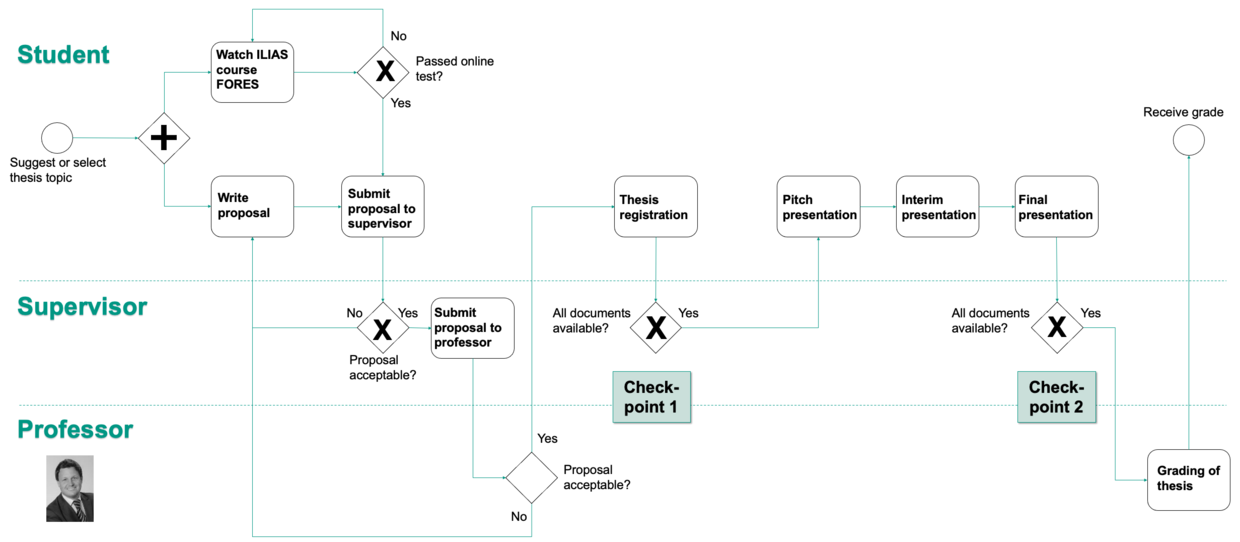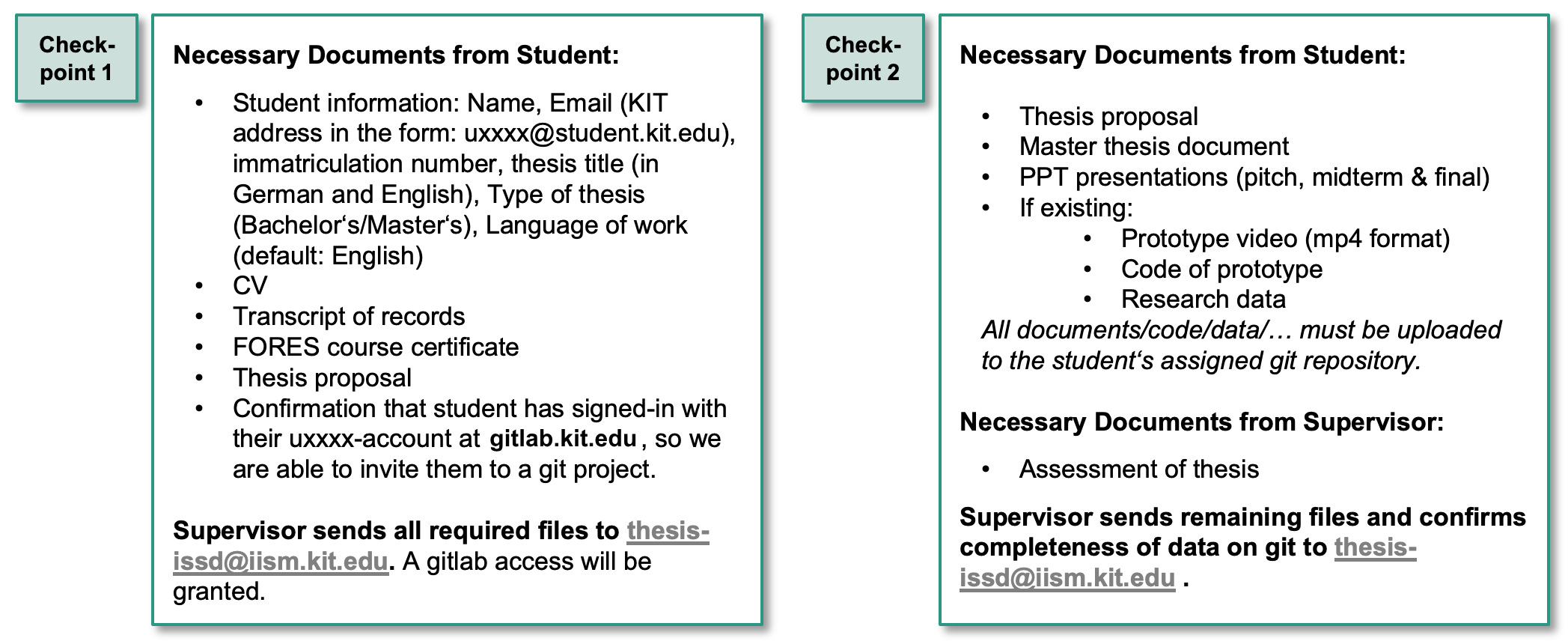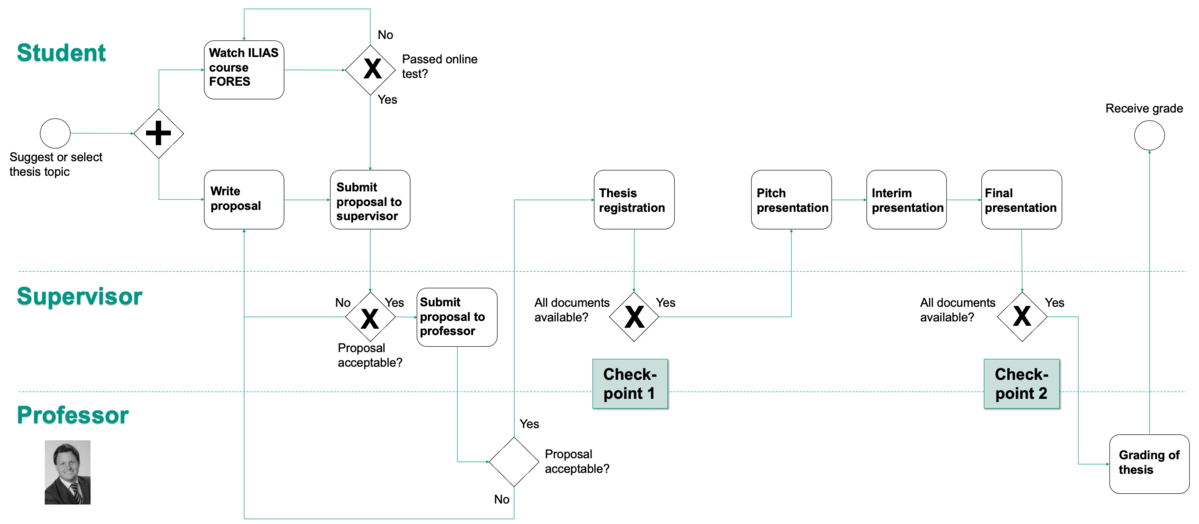Thesis Process and Modalities

Each thesis follows this process. Moreover, participation in each colloquium is mandatory for all students (1x every two weeks). You can find all details here.

Modalities and Colloquium
Welcome
If you are interested to write your bachelor or master thesis at our research group, you will find all required information to start your successful research project on this page
In general, there are no formal prerequisites to write a thesis at our research group. We suggest prior participation in one of our seminars. During the early stages of the thesis process you are required to successfully participate in our online course "FORES- Foundations of HCI & IS Research" on ILIAS. However, you are free to already complete the course before you begin (or apply for) your thesis.
1. How to find a topic?
There are two ways to identify your research topic:
-
You can check the list of currently available thesis topics.
- You can take a look at our research team to see on which we are currently working. Based on this, you can suggest a thesis topic by yourself.
2. Apply for a thesis
After you identified an interesting thesis topic, please contact the team member that has either announced the thesis topic or fits at best to your individually developed thesis proposal. When you contact us for the first time, please provide the following:
-
A short CV (including potentially relevant experience to the topic),
- Your transcript of records (“Notenauszug”),
- A short thesis description (only in case you suggest the topic by yourself)
- An short motivation why you are interested in this topic.
3. Thesis process
After you and your supervisor agreed a topic, our thesis process starts (see figure). This process will guide and support you through your thesis project.
FORES course
To accomplish the FORES course (the updated version of our DORIS course) and receive the certificate you have to join the following course: https://ilias.studium.kit.edu/goto.php?target=crs_1987831&client_id=produktiv After completion of the course on ILIAS you receive the certificate which you have to submit to your supervisor at Checkpoint 1.
Proposal
As a first step, you discuss the topic with your supervisor and prepare a thesis proposal that should include the following items:
-
Working title
- Motivation of the research problem and the research question
- Summary of background literature and state of the art solutions
- Proposed research method
- Outline of the thesis
- Preliminary literature list
- Work plan including monthly milestones
Based on this submission you will receive feedback by Prof. Mädche. Either we will ask you to revise the proposal or you will be officially registered ("Zulassung für Abschlussarbeit"). For the registration, please send all required documents to your supervisor, and then he or she will register your thesis with our thesis team. Your thesis will be registered only when all required documents are received. Meanwhile, we will reserve a repository on Gitlab to store your relevant files.
Required documents
See thesis process figure for all required documents.
Thesis Colloquium
In addition to the individual supervision by one research group member, you are expected to attend the thesis colloquium. The main goal of our colloquium is to foster the exchange between students (e.g., with similiar thesis topics or research methods). Furthermore, it is an opportunity for you to practice your presentation and feeback-giving skills.
The participation in the colloquium is mandatory and will be part of the overall grading of your thesis. However, due to the increased frequency (bi-weekly), you can miss a maximum of two sessions during the thesis process. The colloquium takes place:
- Once every two weeks (typically on Thursday afternoon), for about 1-1.5 hours (depending on current number of presentations)
- In our conference room (Kollegiengebäude am Kronenplatz 05.20/Kaiserstraße 93) in the fifth floor (5C-01)
Within the colloquium, each student has to present his or her thesis three times (pitch, intermediate, final presentation).
For the preparation of your presentation, please consider:
- The PowerPoint template provided by us
- The presentation is divided in:
- Your time for presenting your results, and
- Q&A from the audience - Presentation slides and length
- Pitch presentation: a single predefined lightning slide, please see our template, 2 min presentation, 3 min discussion
- Intermediate presentation: a single predefined lightning slide, please see our template, 2 min presentation, 3 min discussion
- Final presentation: 20 min presentation, 10 min discussion
Write the thesis
When writing the thesis, please consider the formatting guidelines provided below. Furthermore, you should report to your supervisor the progress of your work at minimum every four weeks. Intermediate consultations are expected to be proactively arranged by yourself to check on the agreed milestones with the supervisor. The form of intermediate consultation is to be agreed upon individually between supervisor and student (e.g. meetings, email-report).
In accordance with the KIT faculties' guidelines on the usage of AI in student work (thesis, seminars, etc.), we consider (generative) AI to be a valuable technology. The main challenge in using (generative) AI in the context of student work is the attribution of individual contributions. To enable a correct assessment, we require transparent documentation of the use of (generative) AI in the appendix of the respective work. We provide a corresponding exemplary documentation table for this purpose in our thesis templates.
Submit the thesis
No later than six months after the official registration, the thesis needs to be submitted. For the submission of the thesis:
-
Send a digital PDF version of your thesis to your supervisor.
- Prepare two bound copies of the thesis, each including the signed affidavit.
- Upload your thesis, presentations and supplementary material (source code, research data, documentation, ...) to the assigned gitlab repository.
Hand in the thesis to your supervisor or to our office assistant.
Grading of the thesis
We try to review and grade your thesis as fast as possible. The grading of the thesis takes various criteria into account, relating both to the thesis as a product and the process of establishing its content. These include, but are not limited to:
-
Correctness of spelling and grammar
- Aesthetic appeal of document and figures
- Compliance with formal rules
- Appropriateness of thesis structure
- Coverage of relevant literature
- Appropriateness of research question and method
- Diligence of own research work
- Significance of research results
- Punctuality of work progress
- Proactiveness of handling research progress
- Assessment of individual contribution based on transparent documentation of (Gen)AI usage
Furthermore, the grading also takes into account
- Your presentation of the final thesis, and
- Your participation and collaboration in the colloquium.
Formatting
The following formatting rules apply:
- Consider the Word and LaTeX templates provided by us
- A Bachelor thesis is expected to have 40 to 60 pages (excluding the cover, table of content, list of figures and tables, references, and appendices)
- A Master thesis is expected to have 60 to 80 pages excluding the cover, table of content, list of figures and tables, references, and appendices)
- The thesis has to be written in English
Please consider, although the thesis is written in English, the affidavit has to be written in German. Every thesis has to contain the following affidavit:
»Ich versichere hiermit wahrheitsgemäß, die Arbeit selbständig angefertigt, alle benutzten Hilfsmittel vollständig und genau angegeben und alles kenntlich gemacht zu haben, was aus Arbeiten anderer unverändert oder mit Abänderung entnommen wurde.«


